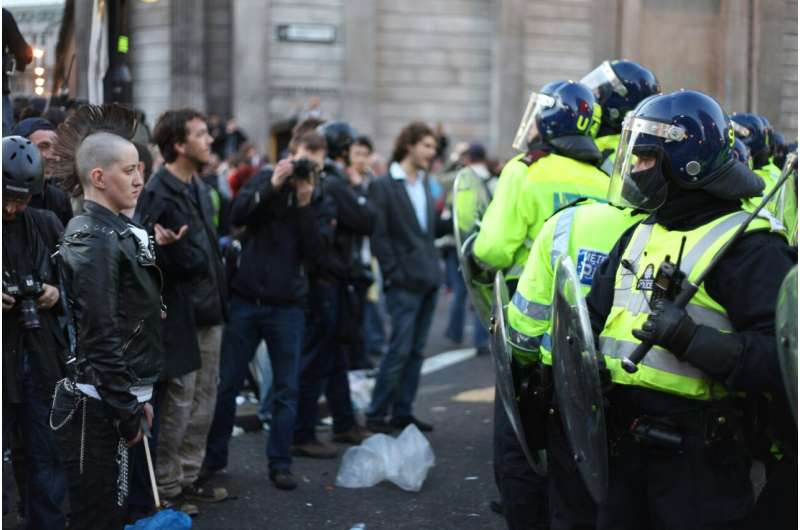This article has been reviewed according to Science X's editorial process and policies. Editors have highlighted the following attributes while ensuring the content's credibility:
fact-checked
trusted source
written by researcher(s)
proofread
Riots in the UK: Online propagandists know how to work their audiences—this is what we are missing

The frightening scenes of far-right extremists clashing with police and even rioting in British towns and cities in recent days have many wondering how to stop the spread of the propaganda that encourages racism, violence and misogyny.
The tough truth is that in seeking to fact check misinformation and force social media companies to remove hateful content, we are doing it wrong. Another message will simply pop up in place of each that is removed. The people who plant propaganda are far more advanced in their methods than the people trying to stop them. They are not thinking about messages but about audience. Hate is clickbait. And social media algorithms put it on steroids.
The unrest started in Southport where a group who claimed to be "protesting" over the deaths of three young girls during a knife attack in the area attacked a mosque. They seemed to believe that the attack was perpetrated by a migrant (which was untrue). More than 50 police officers were injured when they responded to the emergency.
Misleading messages about the Southport attack were posted online and Reform MP Nigel Farage "questioned" whether we were being lied to about the Southport attacker's identity (although he told the BBC that he had "merely expressed a sense of sadness and concern that is being felt by absolutely everybody I know").
Our working definitions of propaganda are hopelessly outdated because they all focus on message. And message is unimportant because propagandists will say anything to generate clicks, income or power. They will post calls to "build a wall" and "stop the boats." They will claim "those kids were murdered in the name of Islam." Factual accuracy is not important, what matters is that those who wield online influence identify and target a powerbase.
If what they say is taken down, they will simply find a different way to say it to the people they are trying to reach. In the meantime, then they can claim to be censored victims of the establishment. They appeal to emotion rather than rationality, and while their messaging is equal parts ludicrous and disturbing to the rest of us, it wins an audience. Therefore, that audience—rather than the messaging—should be our focus.
'Imagined communities'
The modern propagandist creates what political scientist Benedict Anderson described as "imagined communities." He argued that states and nations (and mass media) are founded by successfully creating a community with its own foundation myths, symbols and history. This chimes with the work of propagandist theorist Jacques Ellul, who argued that myths were central and necessary to successful propaganda.
Some symbols are well known and largely shared among us all—spitfires, the British bobby, royalty. But others, like the "cockroach" immigrant, the loss of national agency, and the language of conspiracy theories, are foundational to a community that speaks only to itself. Worse still, those who don't share their beliefs are naive and need to "do their own research." Marianna Spring, the BBC disinformation and social media correspondent, found in her book Among the Trolls, algorithmic rabbit holes with their own imagined communities.
Such myths are also fundamental in the process of generating "agitation" propaganda. Traditionally, agitation propaganda is the casus belli summoned by states to send people to war. In the same way, the hatred of today's racist bigot and the misogyny of the incel are both founded in "agitation" propaganda. Influencer Andrew Tate, for example, has made his name summoning an army of men to fight for his cause.
As Ellul would have it, "hate is generally its most profitable resource … Hatred is probably the most spontaneous and common sentiment, it consists of attributing ones misfortunes and sins to 'another'… Propaganda of agitation succeeds each time it designates someone as the source of all misery, provided that he is not too powerful."
Add to this mix social media bots and it brews a poison for our democratic public sphere.
Finding the lost
Fact checking is not useless, but it doesn't resolve the central problem. Better to identify the silos, and work with their members. We could water down the messaging being sent out to the people causing unrest on the streets with other, better sources. We might even even block some of the networks that deliver the content.
This is better than playing fake news whack-a-mole. Once we have identified the silos of information, we can target the algorithms that create them, and those being targeted or isolated. We can then mediate and ameliorate the problem by reaching out to these groups, spending our energies introducing alternative views, new symbols and foundational myths, negating the effects of algorithm that led them to their silo.
Spring writes of people whose lives have been ruined, of charlatans who create clickbait, but most of all the pathos of those dragged down. Factchecking simply convinces the converted that those who don't share those views have taken the blue pill of blissful ignorance, rather than the red pill of painful knowledge.
Malicious actors are more than prepared to "flood the zone with shit," as Trump adviser Steve Bannon puts it. This makes clearing the misinformation impossible, but, by thinking about audience first, we can, maybe, find the lost, and lead them through the storm.
Provided by The Conversation
This article is republished from The Conversation under a Creative Commons license. Read the original article.![]()





















